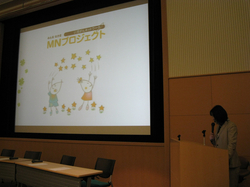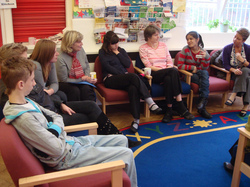Preparing children with chronic disease for independence
HOME > Research and other medical related news > Research and accomplishment
- 6/Feburary/2012
In order to help children with chronic disease to be independent as a member of society,
Habataki Fukushi Jigyoudan (Habataki welfare project) began to develop the program involved in comprehensive support for school life and treatment during child development since 2009 (Heisei 21)
Despite the difference in disease, there is a common problem, namely, “independence” among children with chronic disease. We held a workshop entitled” development of support program for independence of children with chronic diseases”. We held discussions with the concept of medical care in children’s growth and development and support program on the view of patient support, education, welfare and family.
More details can be found here.
Ms. Tomoko Omata, one of panelists at this workshop
Childhood cancer survivor, the representative of childhood cancer network MN project, caseworker gave a lecture entitled” the necessity of psychological support for child patient”. At the present day, curable rate of childhood cancers estimates range from 70 percent to 80 percent.
She cited the effect of long-term treatment and care involved in childhood cancer from the standpoint of both positive and negative aspect. The challenge of independence is required for patient, supporter and society.
More details can be found here.
Ms. Omata gave the following challenges as the challenge of independence for patients.
1) Awareness of disease and condition.
2) Restructuring the relationship between family and circumstances
3) Organizing the disease experience
4) Interaction with peers
5) Collection and understanding of necessary information
We examined self-management program “staying positive” developed and implemented for children with chronic diseases since there is no program to address.
More details can be found here.
What is self-management program “staying positive” workshop?
Background
As the national policy by United Kingdom,
Self-management program “staying positive” was developed and provided for children, ranging from 12 to 18 years old at the request of government.
When the original chronic disease self-management program for adults created a good reputation, Dr. Kate Harley modified and redesigned support program developed by the Stanford university in the USA
Details and evaluation of program for adults are found here.
Program policies
The program is based on interview survey among children with diseases. We cover the problem faced with adolescent children and chronic illness.
We focused on developmental age of children as well as children’s interest and adopted not medical model but psychosocial model.
Please find eleven basic concepts here.
*Target the problems faced with children
*Combine serious practice, fun and play
*Each practice is not an accurate answer.
Before judging the between right and wrong, contact with child feeling and have both positive and negative viewpoint.
Enable children to express anger towards having diseases.
Be preferable to be similar age of both facilitator and participants.
2) Learn how to manage their disease.
3) Live independently for future.
About workshop
*Workshop was held for three consecutive days on weekend and holiday.
*More than 6 participants, with ranging from 12 to 18 years old, were required for conducting it.
*The constitute member of facilitator consists of 3 children. Adult caregiver stays on site but not allowed to attend the workshop.
*Workshop participants have some regulations to comply with confidentiality and esteem each other. *Each facilitator conducts assigned tasks according to instruction manual.
More detailed manuals can be found here.
The certificate of assurance is given on the condition that they are fulfilled. There are also training course for adult caregiver. More details can be found here.
We redesigned the new program for children on the basis of this program. In addition, we had an agreement with the Stanford university to abolish their authorship over this new program since it is very different from original program for adults.
One boy in the participants attended the workshop, later becomes facilitator and actively works now. The other boy had been bullied in the past. He offered to change school, and adopted a new school. One the background of these experiences, it is clear for us to know he takes a positive stance. More details can be found here.






 お問い合わせ
お問い合わせ